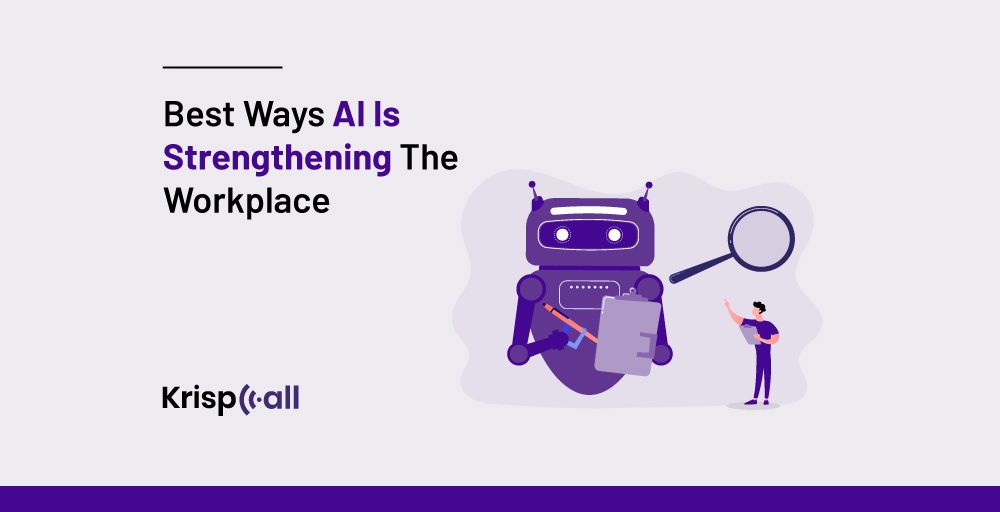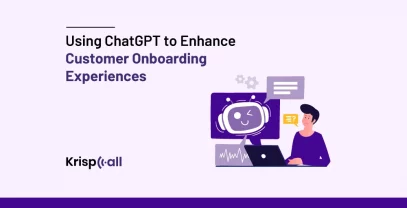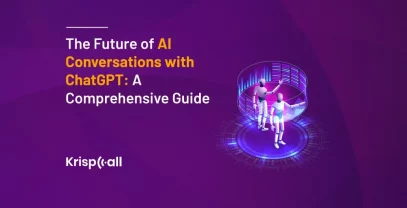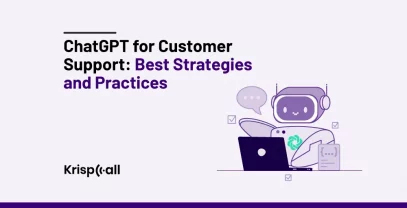In today’s workplace, repetitive tasks and mountains of data can slow us down.
According to Social Shepherd, more than 80% of companies have adopted artificial intelligence (AI) in some way.
AI can make things faster, smarter, and more efficient which can boost your company’s growth and productivity. Let’s explore the top 6 ways AI is strengthening the workplace!
What is the role of AI in today’s workplace?
AI is a big part of today’s workplace because it speeds up and simplifies tasks for a variety of businesses. Employees can concentrate on more significant and creative work as they manage repetitive duties. AI systems can quickly evaluate massive volumes of data and provide enterprises with insightful information to help them make better decisions. Artificial intelligence (AI) chatbots in customer care provide prompt answers to frequently asked inquiries, improving customer support and enhancing customer satisfaction.
AI facilitates remote work by providing the best communication tools and continuous team collaboration, regardless of geographical location. AI in manufacturing forecasts, when equipment may malfunction, allows businesses to make repairs before they become serious issues and save money and time. Furthermore, AI improves cybersecurity by promptly identifying and addressing risks and shielding private data from intrusions.
Additionally, AI-personalized marketing campaigns create more engaging and customized experiences. AI helps with disease diagnosis and treatment planning in the medical field, enhancing patient care and results.
What are the 6 best ways AI is strengthening the workplace?
In the workplace, AI technology is used in a variety of ways, often to reduce human error, save money, and make better, data-driven decisions for the entire organization and everyone in it.
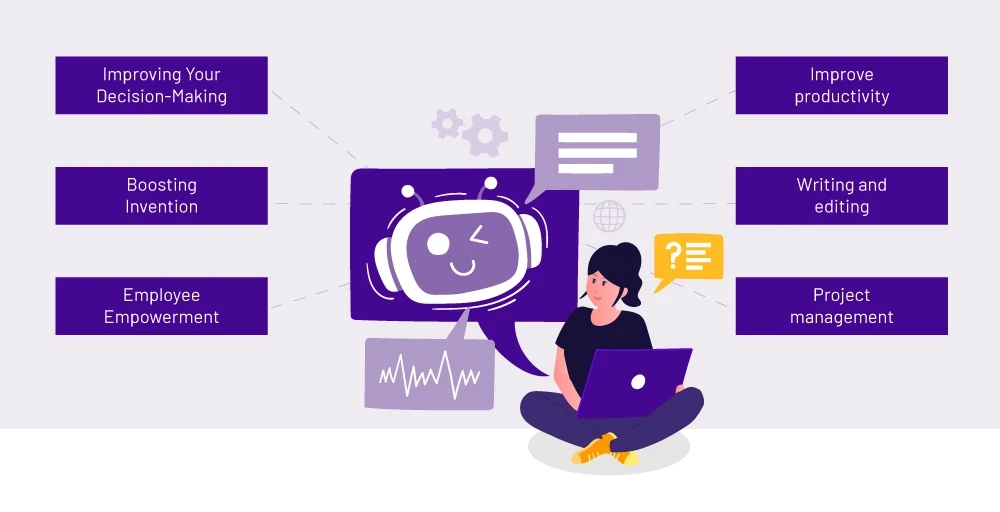
The workplace is being revolutionized by AI in many ways, and the six approaches you’ve highlighted each have a unique influence. The following are some ways that AI improves the workplace:
1. Improving Your Decision-Making
AI improves decision-making by offering real-time insights, predictive modeling, and sophisticated data analytics. Large volumes of data may be processed by AI algorithms which can then be used to find trends, patterns, and errors that human analysis could miss.
With the use of data-driven insights and future consequence forecasting, tools such as IBM Watson Analytics and Microsoft Power BI assist businesses in making well-informed decisions.
- Data Analysis: AI can quickly analyze large amounts of data, finding patterns and insights humans might miss.
- Predictive Modeling: AI can predict future trends based on past data which can help you to plan better.
- Real-Time Insights: AI provides up-to-date information, so decisions are based on the latest data.
- Risk Assessment: AI can identify potential risks and suggest ways to avoid them.
- Recommendation Systems: AI offers recommendations based on data analysis which improves decision accuracy.
- Scenario Simulation: AI can simulate different scenarios to show possible outcomes of your decisions.
2. Boosting Invention
AI improves research and development procedures, which promotes innovation. AI can go through scientific data, trademark filings, and market trends to suggest new product ideas and enhancements by utilizing machine learning algorithms. Artificial intelligence (AI)-driven systems, such as IBM’s Project Debater and Google’s DeepMind, examine large knowledge repositories to produce original theories and solutions that spur innovation.
3. Employee Empowerment
AI gives workers more power by giving them access to resources that improve their abilities and output. AI-driven virtual assistants, such as Google Assistant and Microsoft Cortana, aid workers with scheduling, reminding, and automating repetitive activities. Employees can gain new skills and knowledge that are specific to their positions and career goals with the support of AI-based training programs, which provide individualized learning experiences.
4. Improve productivity
When implementing better AI strategies in the workplace AI increases productivity as it optimizes workflows and automates repetitive operations. Robotic process automation (RPA) solutions like UiPath or AutomationRoutine tasks like data entry, invoice processing, and customer support inquiries can be handled anywhere. AI also aids in predictive maintenance, which lowers downtime and guarantees the smooth operation of equipment and systems.
5. Writing and Editing
Artificial intelligence (AI) technologies facilitate writing and editing by suggesting appropriate language and style, improving readability, and ensuring consistency. Natural language processing is used by programs like Grammarly and Hemingway Editor to assist authors in producing content that is error-free, concise, and easy to read.
Document editing, idea generation, and draft creation can all be aided by AI-driven content creation tools, such as OpenAI’s GPT. AI is significantly enhancing the workplace in various aspects, including writing and editing as mentioned below:
- Grammar and Style Correction: AI tools like Grammarly and Hemingway Editor provide instant feedback on grammar, punctuation, and style errors that help writers produce better and more professional content.
- Enhanced Readability: AI algorithms analyze the readability of text and offer suggestions to simplify complex sentences and improve overall clarity, ensuring that the content is easily understandable by the audience.
- Consistency Check: AI ensures consistency in writing style, tone, and terminology across documents, maintaining a cohesive brand voice and professional image for the organization.
- Content Generation: AI-powered platforms such as OpenAI’s GPT can generate content ideas, create drafts, and even write complete articles or reports which free up valuable time for writers to focus on higher-level tasks.
- Editing Assistance: AI assists in editing documents by identifying and correcting errors, enhancing the quality of the writing, and ensuring that the final product meets high standards.
6. Project management
With its capabilities for better scheduling, planning, and resource allocation, artificial intelligence (AI) improves project management. Project management apps with artificial intelligence (AI), like Monday.com, Trello, and Asana, can forecast project completion dates, distribute resources effectively, and spot possible hazards. These technologies evaluate project data, offer real-time updates, and suggest the best course of action to guarantee project success using machine learning algorithms.
AI is strengthening decision-making, encouraging creativity, empowering workers, increasing productivity, supporting writing and editing, and simplifying project management—all of which contribute to a stronger workplace. Workplaces that are more inventive, efficient, and adaptable are the result of these developments.
Key Examples of AI in the Workplace
Artificial intelligence (AI) is being implemented into more and more elements of the workplace to improve productivity and decision-making. Here are a few notable examples of AI in action:
1. HR Predictive Analytics
HR uses AI for predictive analysis to forecast employee performance and recruitment needs by analyzing historical data and identifying patterns such as:
- Talent Acquisition: AI systems use data analysis to forecast qualified applicants and minimize the time and expense of the hiring process.
- Workforce Diversity Enhancement: AI examines hiring trends and makes recommendations to ensure a diverse workforce.
2. Healthcare
By analyzing medical data and automating repetitive processes, artificial intelligence (AI) in healthcare improves patient care, diagnoses, and efficiency in operations.
- Medical Diagnostics: AI assists in diagnosing diseases by analyzing medical images and patient data. Tools like IBM Watson Health and Google’s DeepMind are used for diagnostic purposes.
- AI-assisted Diagnosis: AI algorithms examine data from medical imaging tests, including MRIs, CT scans, and X-rays To help medical personnel make quick and accurate diagnoses.
- Medical Document transcription: It is made easier and more accurate with the use of Automatic Speech Recognition (ASR) technology which translates spoken words into written text using sophisticated algorithms and machine learning models.
- Drug Development and Discovery: Artificial Intelligence expedites the process of finding new drugs by identifying and predicting the efficacy of large datasets.
- Administrative Efficiency: Artificial intelligence (AI) reduces paperwork and enhances overall operational efficiency in healthcare companies by streamlining administrative operations like scheduling and billing.
Case studies of AI used Cases :
Case Study 1: JPMorgan Chase & Co.
One of the largest banks, JPMorgan Chase employs artificial intelligence (AI) to enhance the services it provides. The bank created a tool called “IndexGPT” that employs artificial intelligence to assist clients in selecting the best assets.
The system makes recommendations for the best investment possibilities after analyzing client information and preferences. The bank has improved customer satisfaction and offered more individualized services with the use of AI.
However, the bank had to spend a lot of money developing the system and making sure it complied with moral standards. The successful application of AI by JPMorgan Chase has enhanced its offerings.
Case Study 2: Artificial Intelligence in Marketing
Artificial intelligence (AI) is being used by Google to simplify and enhance marketing. AI is useful for content creation, website design, and even customer support. AI can create a website more quickly and affordably.
Additionally, it can create customized emails, social media postings, and articles for every client. Advertising can also benefit from AI, as it can target the correct audiences with the proper ads. AI can also offer recommendations for enhancing a website’s search engine visibility.
These artificial intelligence (AI) solutions accelerate, improve, and streamline marketing, enabling companies to expand and thrive.
Conclusion
Artificial Intelligence (AI) in the workplace is transforming work through improved decision-making, innovation, employee empowerment, productivity gains, support for writing and editing, and project management simplification.
AI makes work environments more productive and creative by automating difficult jobs and analyzing massive volumes of data. This frees up staff to concentrate on more strategic and creative work. Real-time insights from AI-powered solutions increase accuracy and decrease human error, both of which boost overall performance.
AI’s uses will increase as it continues to develop, providing even more chances for businesses to prosper and stay competitive in a market that is changing quickly. These developments open the door to more inventive, flexible, and productive workplaces in the future.

